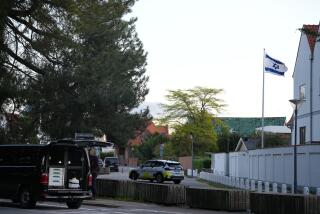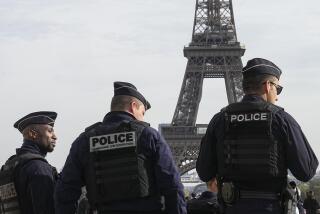Greece halts overseas air shipments after bombs found
- Share via
Reporting from Athens — Greece on Wednesday suspended all overseas air shipments for 48 hours, screening thousands of packages and launching a manhunt for local militants believed to have orchestrated a campaign to send parcel bombs to embassies in Athens, international organizations and European leaders.
Authorities said the suspension came after a parcel bomb slipped through security at Athens International Airport this week and reached the office of German Chancellor Angela Merkel. A second, addressed to Italian Premier Silvio Berlusconi, caught fire as officials handled it at Bologna airport in Italy.
In addition, two parcel bombs were detonated in the cargo section of the Athens airport, officials said. Other bombs detected in Athens were destined for the embassies of Belgium, Bulgaria, Chile, Germany, Mexico, the Netherlands, Russia and Switzerland.
None of the parcels caused serious injuries and none examined by investigators contained lethal amounts of explosives, authorities said. No group had claimed responsibility for the bombs as of Wednesday night.
Greek National Police Chief Lefteris Economou said the cases did not appear to be related to the incidents last week in which two U.S.-bound airplanes from Yemen were found to be carrying powerful explosives inside computer printers in a plot apparently tied to Al Qaeda.
“There is not a shred of evidence suggesting Al Qaeda involvement,” Economou said. “It all appears to be local and part of the terrorists’ agenda to stir trouble.”
With municipal elections scheduled Sunday and ruling socialists expected to suffer huge losses, pundits and politicians expressed concern that the parcel bombs could further polarize political tension in the country.
“These irresponsible and mindless attacks aimed at damaging Greece’s huge efforts to put the economy back on track and regain credibility will not succeed,” Prime Minister George Papandreou told a campaign rally late Tuesday.
Two men were arrested this week and charged on suspicion of sending a parcel bomb and planning attacks against embassies and French President Nicolas Sarkozy.
State security officials said Wednesday that the younger of the two suspects, a 20-year-old chemistry student, ranked among the most wanted members of the Conspiracy of the Cells of Fire, a militant anti-authority movement known as SPF. Both men were arrested shortly after dropping off a batch of parcel bombs at a private courier company Monday, authorities said, and the two have refused to divulge any details about their militant confederates. They face as many as 25 years in prison if convicted.
Authorities are seeking at least five other group members believed to have assisted in the letter bomb campaign.
One senior police official involved with the investigation said the parcel bombs were unlikely to have killed anyone.
“The quantity of explosives found in the parcels was very small,” said the official, who spoke on the condition of anonymity. “Each package featured a small makeshift device and explosives tucked in an envelope of documents or a magazine.”
Analysts said the incidents seemed to point to the Conspiracy of the Cells of Fire, which in 2008 waged a series of bomb attacks that rocked Athens and the northern city of Thessaloniki in what the group called “a new, rabid [style] urban warfare.”
“Their choice of targets this time around was emblematic of their intent,” said John Brady Kiesling, a former U.S. diplomat and authority on Greek terrorism. “They clearly wanted to internationalize their cause and send a message of solidarity to countries where anarchists are currently imprisoned.”
Mary Bossis, a leading terrorism expert and professor at the University of Piraeus, referred to those involved with the parcel bombs as amateurs, but ones who probably will be remembered.
“They pulled off … a canny stunt,” Bossis said. “And that, regardless of the repercussions they will face, will place them in the pantheon of Greek terrorists.”
Carassava is a special correspondent.
More to Read
Sign up for Essential California
The most important California stories and recommendations in your inbox every morning.
You may occasionally receive promotional content from the Los Angeles Times.










